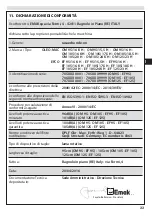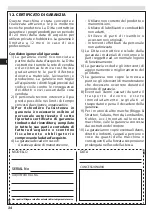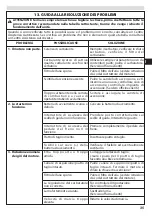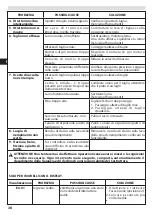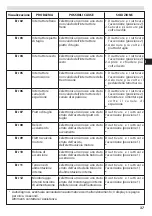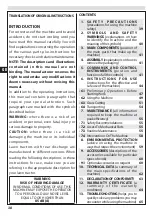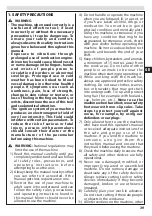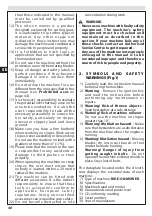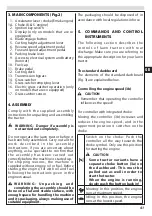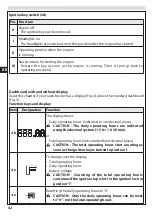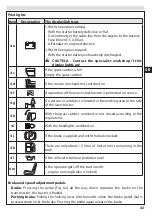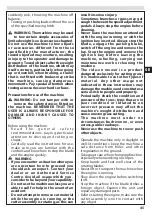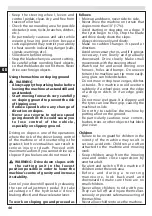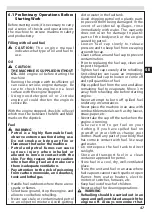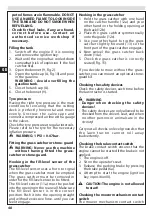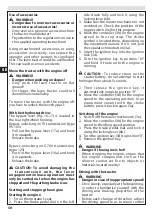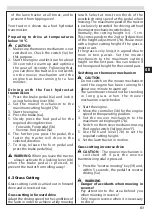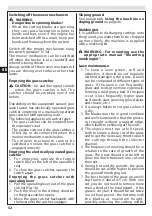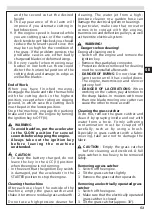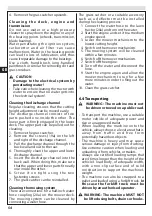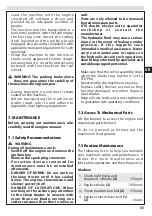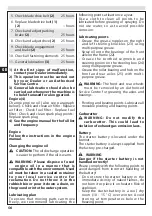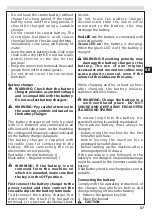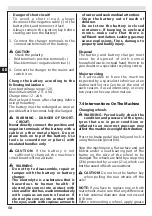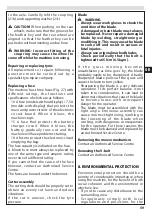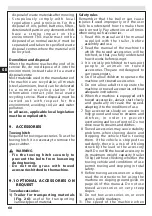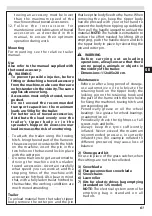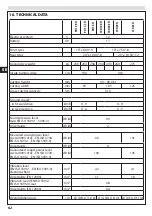
47
GB
6.1 Preliminary Operations Before
Starting Work
Before starting work, it is necessary to carry
out a series of checks and operations on
the machine to ensure maximum safety
and productivity.
Filling with oil and fuel
C AU T I O N : T h e e n g i n e m a n u a l
indicates what type of oil and fuel to
use.
Oil
CAUTION
- THE MACHINE IS SUPPLIED WITHOUT
OIL. Add engine oil before starting the
machine.
- Running the engine with insufficient oil
can cause serious engine damage. Be
sure to check the engine on a level
surface with the engine stopped.
- Using non-detergent oil or 2-stroke
engine oil could shorten the engine’s
service life.
With the engine stopped, check its oil level
which must be between the MIN and MAX
marks on the dipstick.
Fuel
WARNING
- Petrol is a highly flammable fuel;
observe extreme caution during use.
Do not smoke or bring any fire or
flame near the fuel or the machine.
- Petrol and petrol fumes can cause
s e r i o u s i n j u r y w h e n i n h a l e d o r
allowed to come in contact with the
skin. For this reason observe caution
when handling fuel and make sure
there is adequate ventilation.
- Pay attention to the risk of poisoning
from carbon monoxide, an odourless,
toxic and lethal gas.
- Handle fuel outdoors where there are no
sparks or flames.
- Select bare ground, stop the engine, and
allow to cool before refuelling.
- Never use stale or contaminated petrol
or an oil/petrol mixture. Avoid getting
dirt or water in the fuel tank.
- Avoid dripping petrol onto plastic parts
to prevent them being damaged. In the
event of accidental spillages, rinse
immediately with water. The warranty
does not cover for damage to plastic
parts of the bodywork or the engine
caused by petrol.
- Loosen fuel cap slowly to release
pressure and to keep fuel from escaping
around the cap.
- Clean surface around fuel cap to prevent
contamination.
- Prior to replacing the fuel cap, clean and
inspect the gasket.
- Tighten fuel cap securely after refuelling.
Unit vibration can cause an improperly
tightened fuel cap to loosen or come off
and spill quantities of fuel.
- Wipe spilled fuel from the unit and allow
remaining fuel to evaporate. Move 3 m
away from refuelling site before starting
engine.
- Never attempt to burn off spilled fuel
under any circumstances.
- Never place the machine in an area with
combustible materials such as dry leaves,
straw, paper, etc.
- Never take the cap off the tank when the
engine is running.
- Take care not to get fuel on your
clothing. If you have spilled fuel on
yourself or your clothes, change your
clothes. Wash any part of your body that
has come in contact with fuel. Use soap
and water.
- Do not expose the fuel tank to direct
sunlight.
- Store and transport fuel in a clean
container approved for petrol.
- Store fuel in a cool, dry, well-ventilated
place.
- Store the unit and fuel in an area where
fuel vapours cannot reach sparks or open
flames from water heaters, electric
motors or switches, furnaces, etc.
- Keep fuel out of reach of children.
- Never use fuel for cleaning operations.
WARNING
- Refuelling should be carried out in an
open and well-ventilated area with the
engine off. Always remember that

